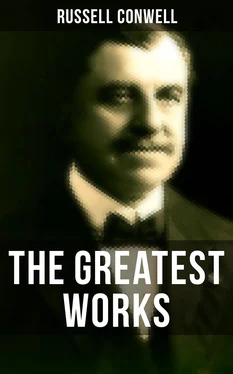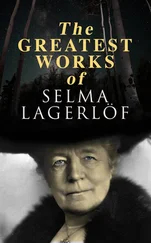The best illustration I ever heard was of John Jacob Astor. You know that he made the money of the Astor family when he lived in New York. He came across the sea in debt for his fare. But that poor boy with nothing in his pocket made the fortune of the Astor family on one principle. Some young man here to-night will say, "Well they could make those fortunes over in New York but they could not do it in Philadelphia!" My friends, did you ever read that wonderful book of Riis (his memory is sweet to us because of his recent death), wherein is given his statistical account of the records taken in 1889 of 107 millionaires of New York. If you read the account you will see that out of the 107 millionaires only seven made their money in New York. Out of the 107 millionaires worth ten million dollars in real estate then, 67 of them made their money in towns of less than 3,500 inhabitants. The richest man in this country to-day, if you read the real-estate values, has never moved away from a town of 3,500 inhabitants. It makes not so much difference where you are as who you are. But if you cannot get rich in Philadelphia you certainly cannot do it in New York.
Now John Jacob Astor illustrated what can be done anywhere. He had a mortgage once on a millinery-store, and they could not sell bonnets enough to pay the interest on his money. So he foreclosed that mortgage, took possession of the store, and went into partnership with the very same people, in the same store, with the same capital. He did not give them a dollar of capital. They had to sell goods to get any money. Then he left them alone in the store just as they had been before, and he went out and sat down on a bench in the park in the shade. What was John Jacob Astor doing out there, and in partnership with people who had failed on his own hands? He had the most important and, to my mind, the most pleasant part of that partnership on his hands. For as John Jacob Astor sat on that bench he was watching the ladies as they went by; and where is the man who would not get rich at that business? As he sat on the bench if a lady passed him with her shoulders back and head up, and looked straight to the front, as if she did not care if all the world did gaze on her, then he studied her bonnet, and by the time it was out of sight he knew the shape of the frame, the color of the trimmings, and the crinklings in the feather. I sometimes try to describe a bonnet, but not always. I would not try to describe a modern bonnet. Where is the man that could describe one? This aggregation of all sorts of driftwood stuck on the back of the head, or the side of the neck, like a rooster with only one tail feather left. But in John Jacob Astor's day there was some art about the millinery business, and he went to the millinery-store and said to them: "Now put into the show-window just such a bonnet as I describe to you, because I have already seen a lady who likes such a bonnet. Don't make up any more until I come back." Then he went out and sat down again, and another lady passed him of a different form, of different complexion, with a different shape and color of bonnet. "Now," said he, "put such a bonnet as that in the show window." He did not fill his show-window up town with a lot of hats and bonnets to drive people away, and then sit on the back stairs and bawl because people went to Wanamaker's to trade. He did not have a hat or a bonnet in that show-window but what some lady liked before it was made up. The tide of custom began immediately to turn in, and that has been the foundation of the greatest store in New York in that line, and still exists as one of three stores. Its fortune was made by John Jacob Astor after they had failed in business, not by giving them any more money, but by finding out what the ladies liked for bonnets before they wasted any material in making them up. I tell you if a man could foresee the millinery business he could foresee anything under heaven!
Suppose I were to go through this audience to-night and ask you in this great manufacturing city if there are not opportunities to get rich in manufacturing. "Oh yes," some young man says, "there are opportunities here still if you build with some trust and if you have two or three millions of dollars to begin with as capital." Young man, the history of the breaking up of the trusts by that attack upon "big business" is only illustrating what is now the opportunity of the smaller man. The time never came in the history of the world when you could get rich so quickly manufacturing without capital as you can now.
But you will say, "You cannot do anything of the kind. You cannot start without capital." Young man, let me illustrate for a moment. I must do it. It is my duty to every young man and woman, because we are all going into business very soon on the same plan. Young man, remember if you know what people need you have gotten more knowledge of a fortune than any amount of capital can give you.
There was a poor man out of work living in Hingham, Massachusetts. He lounged around the house until one day his wife told him to get out and work, and, as he lived in Massachusetts, he obeyed his wife. He went out and sat down on the shore of the bay, and whittled a soaked shingle into a wooden chain. His children that evening quarreled over it, and he whittled a second one to keep peace. While he was whittling the second one a neighbor came in and said: "Why don't you whittle toys and sell them? You could make money at that." "Oh," he said, "I would not know what to make." "Why don't you ask your own children right here in your own house what to make?" "What is the use of trying that?" said the carpenter. "My children are different from other people's children." (I used to see people like that when I taught school.) But he acted upon the hint, and the next morning when Mary came down the stairway, he asked, "What do you want for a toy?" She began to tell him she would like a doll's bed, a doll's washstand, a doll's carriage, a little doll's umbrella, and went on with a list of things that would take him a lifetime to supply. So, consulting his own children, in his own house, he took the firewood, for he had no money to buy lumber, and whittled those strong, unpainted Hingham toys that were for so many years known all over the world. That man began to make those toys for his own children, and then made copies and sold them through the boot-and-shoe store next door. He began to make a little money, and then a little more, and Mr. Lawson, in his Frenzied Finance says that man is the richest man in old Massachusetts, and I think it is the truth. And that man is worth a hundred millions of dollars to-day, and has been only thirty-four years making it on that one principle—that one must judge that what his own children like at home other people's children would like in their homes, too; to judge the human heart by oneself, by one's wife or by one's children. It is the royal road to success in manufacturing. "Oh," but you say, "didn't he have any capital?" Yes, a penknife, but I don't know that he had paid for that.
I spoke thus to an audience in New Britain, Connecticut, and a lady four seats back went home and tried to take off her collar, and the collar-button stuck in the buttonhole. She threw it out and said, "I am going to get up something better than that to put on collars." Her husband said: "After what Conwell said to-night, you see there is a need of an improved collar-fastener that is easier to handle. There is a human need; there is a great fortune. Now, then, get up a collar-button and get rich." He made fun of her, and consequently made fun of me, and that is one of the saddest things which comes over me like a deep cloud of midnight sometimes—although I have worked so hard for more than half a century, yet how little I have ever really done. Notwithstanding the greatness and the handsomeness of your compliment to-night, I do not believe there is one in ten of you that is going to make a million of dollars because you are here to-night; but it is not my fault, it is yours. I say that sincerely. What is the use of my talking if people never do what I advise them to do? When her husband ridiculed her, she made up her mind she would make a better collar-button, and when a woman makes up her mind "she will," and does not say anything about it, she does it. It was that New England woman who invented the snap button which you can find anywhere now. It was first a collar-button with a spring cap attached to the outer side. Any of you who wear modern waterproofs know the button that simply pushes together, and when you unbutton it you simply pull it apart. That is the button to which I refer, and which she invented. She afterward invented several other buttons, and then invested in more, and then was taken into partnership with great factories. Now that woman goes over the sea every summer in her private steamship—yes, and takes her husband with her! If her husband were to die, she would have money enough left now to buy a foreign duke or count or some such title as that at the latest quotations.
Читать дальше












